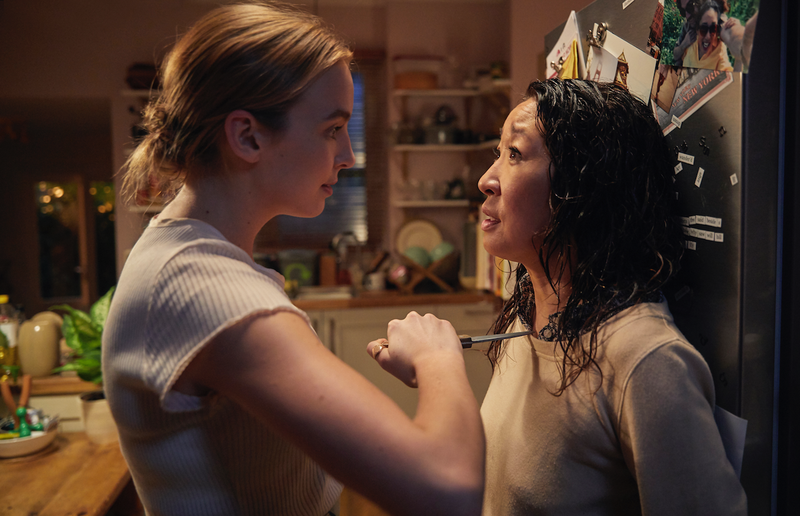When Killing Eve crashed on our screens last year, it felt like a breath of fresh air: a feisty and funny entry in the recent revival of the staid, stuffy and overwhelmingly masculine spy genre. With a second season to air in April and the coming release of the second book in Luke Jennings' "Codename Villanelle" series, it is clear Eve and Villanelle -- the MI6 operative and the talented assassin she is tracking -- will be with us a while longer.
Yet the books and the show inhabit different universes. Like Game of Thrones, the series has strayed from its source material. Although in Jennings' short stories and novellas the characters of Eve and Villanelle are vivid, they still operate in a Le Carre-like world. This is the realm of old boys' networks (Eve's boss is not a world-class female spy as in the show but a patrician, privately educated man) with very few women anywhere. Eve and Villanelle work in environments dominated by men and are subjected to the male gaze -- not just of the men they interact with but of their creator.

What's fascinating is a book so wedded to genre conventions, with two women operating in a masculine, violent world, has been transformed into a quirky, funny love letter to female obsession that feels authentic to female viewers. Under the guidance of Phoebe Waller-Bridge, best known in the U.K. for the show Fleabag, women are front and center. Eve (Sandra Oh) is older. She is still bored with her life and her safe marriage, but she has a weariness that comes with being in her 40s and wondering whether this is it. Evidently practical, she packs yeast infection cream in her suitcase when she travels to Berlin on the hunt for a serial assassin; the sight of the small tube causes Villanelle (Jodie Comer) to exclaim "poor baby" when she's rifling through her stolen trophy. When Eve recovers her suitcase, now full of designer clothes from exclusive Berlin boutiques, it is the one thing Villanelle has put back -- a subtle nod to a sisterhood only another woman could understand. Similarly, Villanelle keeps tampons and bullets in the same drawer in her closet. Her femininity is no barrier to her lethality, which is utterly indiscriminate.
These are women viewed through the lens of other women: They are the only people to truly see and understand each other, and that female connection is uncommon in the cat-and-mouse game of international spying. Although the directors of the show are mainly men (and Jennings has retained a writing credit), the characters are created through the prism of Waller-Bridge's mind, one which understands and writes women exceptionally well. Such is the force of Waller-Bridge's direction that this is the rare example of a spy drama that has overwhelmingly appealed to female viewers; as well as the endless op-eds about the clothes, women have warmed to the fact that the central characters in this show seem relatable and, in Eve's case, ordinary while jetting around Europe for work wearing a frumpy coat.
As a wry twist, many of the murders happen in the home. Villanelle tells a rogue MI5 agent she has "a thing for bathrooms," which is where she first confronts Eve. This is not the concrete jungle of George Smiley and James Bond, but a familiar domesticity that makes the show funny -- but also terrifying. The adaptation of Killing Eve also might surprise viewers with how little the central characters use their sexuality. One of Eve's earliest scenes shows her in bed with her husband, casually debating whether they should have sex before turning out the lights. (They ultimately agree they are too tired.) It is odd that in the wake of the #MeToo movement this feels refreshingly revolutionary. In contrast, the Villanelle of the books uses her sexuality in ways that feel gratuitous and predictable.
There have been other recent attempts to bring more women into the espionage genre, with varying degrees of success: Olivia Colman's heavily pregnant intelligence officer in The Night Manager felt subversive, yet Elizabeth Debecki's character in the same show and Florence Pugh's actress-turned-spy in the recent adaptation of The Little Drummer Girl did not. What these programs lacked was a feeling that the writers understood women. With news Waller-Bridge is stepping back from writing duties on Killing Eve to focus on Fleabag (she will still retain a producer credit), it remains to be seen just where our favorite psychopath assassin and her doggedly determined pursuer will take us next. Wherever it is, we can only hope it is fabulous, scary and unexpected.
Style on 03/17/2019

